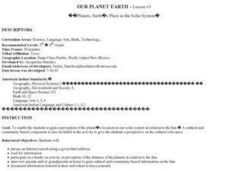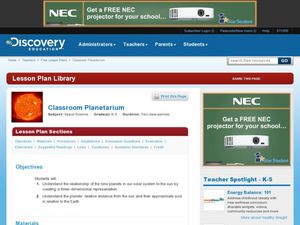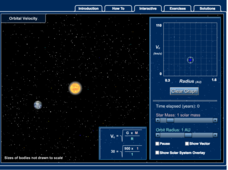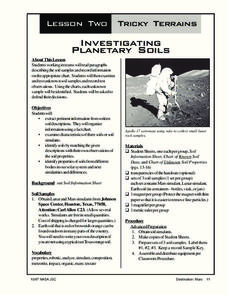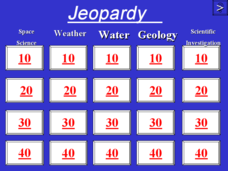Curated OER
Word Processing and Internet Planet Report
Fourth graders write a research report on a selected planet in the solar system. They conduct Internet research, save a graphic from the Internet onto a disk, bookmark websites, and present their report.
Curated OER
Earth's Place in the Solar System
Learners study and discuss the planets. They create a visual representation of the layout of the solar system and color it. They also write an informative/narrative summary report on the cultural relevance of the Sun.
Curated OER
Our Solar System
In this solar system worksheet, learners find the names of the eight planets in the word search puzzle. The names of the planets are listed.
Curated OER
What are Stars?
Students research the solar system and it's characteristics. For this solar system lesson, students are broken into 4 groups, each assigned a specific part of the solar system. Students use the Internet to research their part...
Curated OER
Classroom Planetarium
Students work in groups to create the planets of the solar system. In this planets lesson plan, students create a hanging solar system taking into account the size, shape and position of the planets. Students discuss the...
Scholastic
Lesson One: The Earth, Background and Glossary
How much do you really know about our planet? Middle schoolers build up their prior knowledge about Earth, its placement in the solar system, its composition, and important geological vocabulary with an introductory earth science lesson.
American Museum of Natural History
What Do You Know About Astronomy
Develop an understanding of the universe. Learners answer 10 multiple choice questions about several topics in astronomy. Questions contain information about the age of the universe, gravitational attraction, galaxies, planets and comets...
McGraw Hill
Orbital Velocity Interactive
Why does it take Pluto 90,000 days to orbit the sun, but it only takes Mercury 88 days? An interactive lesson helps pupils find a connection between the speed of orbit and distance a planet is from the sun. The simulation allows for...
Curated OER
Sky Watching
Students complete night-sky observations to understand how our knowledge of the sky has been enhanced by telescopes. Students complete a timeline worksheet giving the history of telescopes. Students then then make their own observations...
Core Knowledge Foundation
Third Grade Skills Unit 7: What’s in Our Universe?
Over four weeks, third graders participate in lessons that boost spelling, grammar, reading, and writing skills. Scholars explore spelling patterns, suffixes, singular and plural possessive nouns, quotations, and conjunctions....
Curated OER
Making Regolith
You may not be able to take a field trip to the moon, but that doesn't mean your class can't study moon rocks. Using graham crackers as the moon's bedrock and powdered donuts as micrometeorites, young scientists simulate...
Curated OER
Earth Science
Learners explore the planets and celestial bodies in our solar system. In this outer space lesson, students identify the planets and record journal information about them and other celestial bodies. Learners define outer space words.
Curated OER
Investigating Planetary Soils
Students study soil characteristics and identify properties of soils from different parts of the solar system. For this soil lesson students divide into groups, read soil descriptions, test and record soil samples.
Curated OER
What Makes Up the Solar System?
In this solar system worksheet, students will fill in the blanks for 5 statements in this graphic organizer based on the objects found in space that make up the solar system.
Laboratory for Atmospheric and Space Physics
Where Are We Going?
Come take a ride on the space bus! Scholars go on an imaginary trip to pick up their peers from the inner and outer planets while reinforcing math skills. First, learners round decimals to identify each planets' distance from Earth....
Laboratory for Atmospheric and Space Physics
Jupiter’s Relative Size
How do you properly illustrate the extreme size difference between two planets—Earth and Jupiter? With the help of jellybeans, of course! Create a scale model of Jupiter's mass compared to Earth using a fishbowl, 1,400 beans, and a...
K12 Reader
The Inner Planets
Here's a reading exercise that uses an article about the inner planets to assess comprehension. After reading the article, kids respond to a series of questions using information from the text.
Curated OER
Jeopardy - Earth Sciences
Questions about water, weather, geology, astronomy, and the scientific process make up this Jeopardy game. It is a pretty well-rounded set of slides, although you may want to be aware that a few of the questions are specific to the state...
Curated OER
Our Solar System
Sixth graders use the internet to examine the different bodies in space. In groups, they select one project they want to complete and are given a timeline for when the sections are due. To end the lesson, they present their information...
Curated OER
Planet Cryptogram
In this science learning exercise, students answer six clues about the solar system. Students use their answers to complete a table with corresponding numbers for each letter.
Curated OER
Meet the Neighbors: Planets Around Nearby Stars
Students explain why a transiting planet causes a periodic dimming in the light from its parent star. They determine the radius of a planet, and its orbital distance, by analyzing data and manipulating equations. Students compare the...
Curated OER
Gravity and the Planets
In this gravity worksheet, students read about the solar system and the effects of the gravity of the sun, the planets and the moon on the orbits of the planets. They answer three critical thinking questions about gravity.
Curated OER
Earth Moon Scaling
A wonderful lesson incorporating math and physics skills along with specific details about the planetary bodies. The cross-curricular approach makes for a valid activity to challenge multiple ages and abilities. Your class could work in...
Curated OER
Chalkboard Challenge: Science Vocabulary
Students play a Jeopary-style game in this engaging PowerPoint. The scientific categories are the solar system, planet, weather, cells, and rocks. These types of interactive games are an excellent way to reinforce the important...
Other popular searches
- Solar System Inner Planets
- Solar System Planets
- Solar System and Planets
- Science Planets Solar System

